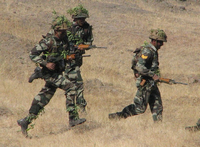Soon after U.S. special operation forces killed Osama bin Laden in a raid deep into Pakistani territory, a journalist asked India's army chief, Gen. V.K. Singh, whether his nation's armed forces had the capability to carry out a similar operation. The military man gave a straightforward answer. "If such a chance comes," he said, "then all the three arms [of the armed forces] are competent to do this." The domestic and international reactions to his statement exemplify the paradox of proximity: Having a fragile state in the neighborhood makes the capability to intervene important, but puts structural constraints on a nation's ability to do so.
Singh did not comment on the wisdom or likelihood of an Indian raid against one of the numerous terrorist leaders who are allowed to operate out of Pakistan. In the Indian system, the army chief is a distant participant in foreign policy. Nevertheless, the general was criticized by many Indian commentators for making aggressive statements. The official Indian response, as articulated by the Foreign Ministry, was that India seeks to continue with the bilateral dialogue. Meanwhile in Pakistan, both the military and civilian leadership picked up Singh's statement and warned of dire consequences should India dare to indulge in such an adventure. In fact, were it not for the precedent that the United States had just set, the U.S. State Department would likely have chipped in with a comment on the merits of restraint and dialogue.
All this misses the point: The Indian political leadership that makes decisions of war and peace is extremely unlikely to entertain proposals that have the slightest likelihood of triggering a war. Atal Behari Vajpayee, India's prime minister during the Kargil War in 1999, is reputed to have dismissed a plea to open a new front in the war, which Pakistan had started, with just four words: "They have the bomb."

